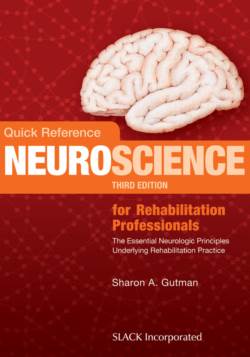|
Book Detail
 |
Quick Reference Neuroscience for Rehabilitation Professionals:
The Essential Neurologic Principles Underlying Rehabilitation Practice
Gutman, Sharon A.
|
Previous ISBN (13): 9781556428005 Category: Occupational Therapy Publisher: Slack, Incorporated Imprint: Slack Incorporated Audience: College/higher education Dimensions: 11.0 x 0.75 x 8.5 in
|
|
|
|
Synopsis:
Quick Reference Neuroscience for Rehabilitation Professionals is a concise and quick reference for the practitioner and student who are learning or reviewing the most relevant neuroscience principles supporting rehabilitation therapy. The updated Third Edition continues to meet a need in the rehabilitation profession that has gone unfilled--the ability to break down neuroscience information into the essential principles that can be used to understand neurological conditions and the principles underlying rehabilitation evaluation and practice. Quick Reference Neuroscience for Rehabilitation Professionals, Third Edition provides a quick review of a specific neuroscience concept or critical neuroscience principles supporting a specific rehabilitation intervention. In this era of information overload, this text rapidly and thoroughly provides condensed information in a user-friendly, easy-to-use format for the practitioner to better convey that information to a patient. Dr. Sharon Gutman has divided the text into three primary sections: the first addresses neuroanatomy; the second addresses the function of neurological systems underlying physical, psychiatric, cognitive, and visual perceptual disorders; and the final section addresses clinical neuropathology related to aging, addiction, memory, and the neurological substrates of sex and gender. A specific section describes the common neurodiagnostic tests that therapists do not administer but must have knowledge of when results are discussed at treatment team meetings.
|
|
|
|
|
|
|